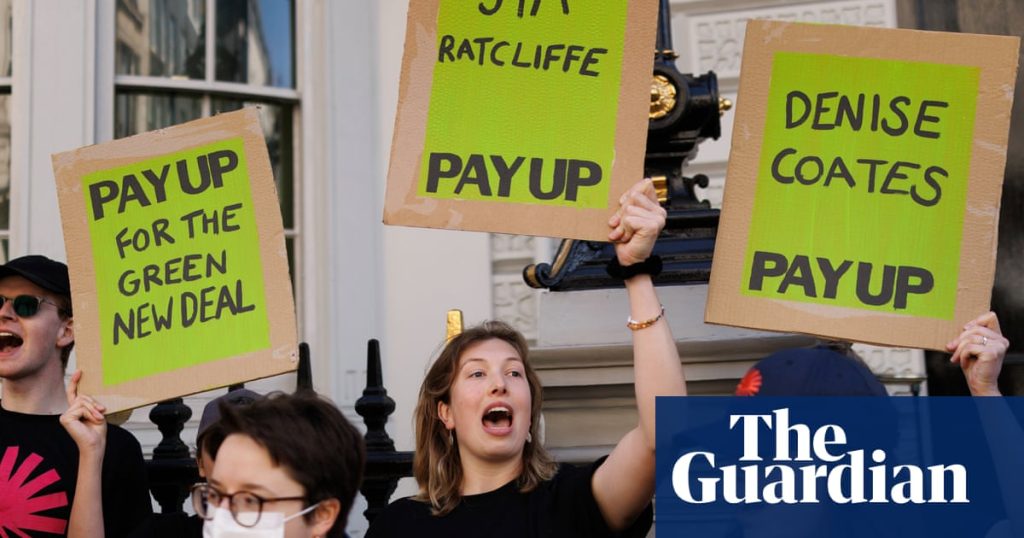A growing number of climate groups are campaigning for the introduction of a wealth tax to ensure the transition to a sustainable economy is not done “on the backs of the poor”.
Last week campaigners from Green New Deal Rising staged a sit-in outside the Reform UK party’s London headquarters as part of a wave of protests targeting the offices, shops and private clubs of the super-rich across the UK.
The Pay Up campaign – backed by more than 20 civil society groups including Friends of the Earth, the National Education Union and Tax Justice UK – is calling on the government to bring in a series of wealth taxes as an alternative to spending cuts. It is one of a number of campaign initiatives focused on overhauling the tax regime being run by climate groups who say the revenue from the ultra-rich could fund investment, restore crumbling public services and help tackle the climate emergency.
“Fixing our broken tax system so that it finally taxes those who earn their income from assets and wealth at the same rates as the majority of the population, who earn their money from work, is the fair thing to do,” said Hannah Martin, a co-director of GND Rising. “We must tax the booming fortunes of the super-rich to rebalance our economy and fund investment in our communities, our schools, libraries as well as much-needed climate action.”
The campaign aims to highlight the growth in extreme wealth held by individuals and corporations in the UK. It calls on the government to introduce a 2% tax on assets over £10m, shut down tax loopholes and increase the tax paid on property and shares so that capital gains tax is equal to income tax. It is also urging the government to stop using public money to bail out big polluters such as failing water companies and fossil fuel firms.
Tax experts at the Tax Justice UK campaign group say a 2% tax on wealth above £10m would raise £22bn every year, and the other tax changes advocated for by GND Rising could raise an additional £50bn in a single year.
Martin said: “Climate campaigners are calling for wealth taxes because we have been told for years that ‘there’s no money’ to tackle climate change. But we can see along with the public there is enough money and it is being hoarded by the super-rich and polluting corporations. We need to unlock that wealth to tackle climate change and the cost of living crisis, and that means focusing on the government’s tax policies to win that change.”
There has been a growing clamour for a wealth tax in recent months from some economists, thinktanks and trade unions. In recent weeks prominent Labour figures including the former leader Neil Kinnock have added their voices.
Opponents, the super-rich and their advisers and supporters, have raised concerns that such a move would result in the ultra-wealthy leaving the country, a narrative that has been amplified by a blizzard of news stories over the past year.
However, experts say there is no evidence of a mass millionaire exodus from the UK, with the overall number of millionaires and billionaires having risen steadily over the past two decades. At the same time most people are faced with stagnating wages, rising living costs and decimated public services.
Zack Polanski, who is standing to be the new leader of the Green party, agreed there should be a wealth tax to ensure the ultra-wealthy – who are also the largest emitters – pay their fair share to tackle the climate crisis.
He argued that under the current plans to reach net zero emissions by 2050 the poorest in society were being asked to “step up to tackle the climate crisis”.
The planet’s most important stories. Get all the week’s environment news – the good, the bad and the essential
Privacy Notice: Newsletters may contain info about charities, online ads, and content funded by outside parties. For more information see our Privacy Policy. We use Google reCaptcha to protect our website and the Google Privacy Policy and Terms of Service apply.
after newsletter promotion
“This is an emergency,” Polanski said. “The government have a series of choices – and right now they are choosing to subsidise dirty and dangerous parts of the economy like aviation, oil and gas. They should instead ensure that the greenest option is always the cheapest. How dare they say there’s no money left at the same time they also refuse to tax the super-rich?”
GND Rising’s Pay Up campaign staged a day of action last week during which more than 200 young people targeted sites connected to Britain’s ultra-wealthy, including the billionaires Jim Ratcliffe of Ineos, the Reform treasurer Nick Candy, and the founder of Bet365, Denise Coates. It said it intended to step up its campaign for a fairer tax system over the summer.
Martin said climate action “must speak to the reality of people’s lives and their anger at the inequality they are seeing in their communities”.
“The climate crisis and economy inequality are two sides of the same coin, because it’s the same broken system making billionaires richer, fuelling the climate crisis, and leaving working people to pick up the bill.”
She warned that unless climate campaigners showed that climate action was “also about fixing inequality and the cost of living crisis, we risk our demands being dismissed as a ‘nice to have’ by politicians, ignoring the very real pain people are facing, and opening up our agenda to attacks by climate deniers like Reform”.

